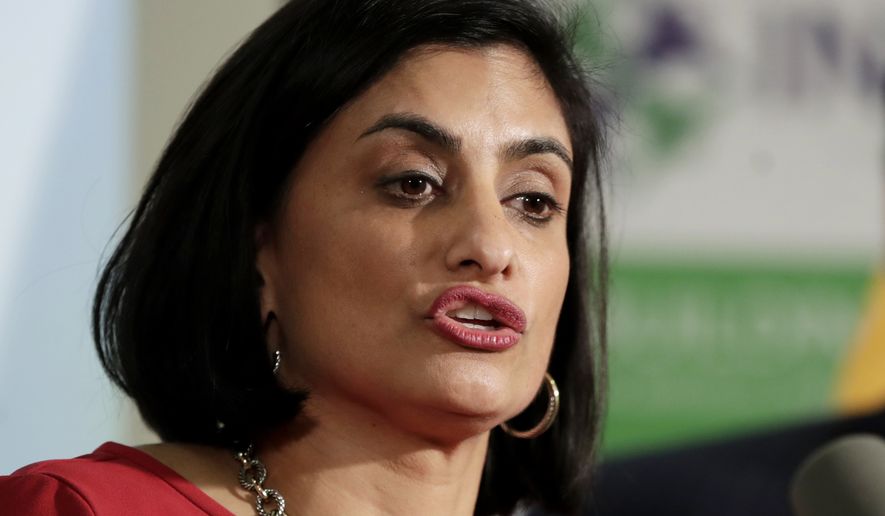The Trump administration on Monday proposed letting private plans in Medicare refuse to cover drugs in a set of “protected classes” if prices rise faster than inflation, saying it will pry deeper discounts from drug makers.
Plans operating in the Part D drug benefit must cover nearly all drugs that fall into six therapeutic classes of treatments for things like cancer or HIV.
Administration officials said that, unfortunately, that guaranteed coverage allows drug companies to charge what they want instead of offering bargains.
“The lack of any ability for Part D plans to manage drugs in the protected classes has allowed the pharmaceutical industry to command high prices on protected class drugs in Part D, without patients getting a good deal,” Health Secretary Alex Azar and Seema Verma, administrator at the Centers for Medicare and Medicaid Services (CMS), wrote in a blog post Monday. “Insurance plans in the private market do not face the same constraint.”
Drugs in protected classes are typically discounted 20 percent to 30 percent in the private insurance market, but only 6 percent under Medicare Part D, the administration said.
CMS officials said it’s only fair to make sure seniors get the same discounts. It says drug companies should be allowed to remove protected-class drugs from their formularies — the list of drugs they cover — if price increases exceed inflation, so insurers have more leverage to negotiate down costs.
A new drug that is not a “significant innovation” over an earlier version— for instance, it only has an extended release — could also be removed from protected-class protection.
Ms. Verma said the changes will save taxpayers $690 million over 10 years.
Guaranteed coverage within the protected classes was included in Part D to ensure patient access while the program was getting set up a dozen years ago. Officials said it was “never intended to be permanent.”
CMS said there are 63 percent more drugs in protected class than when the policy was created a dozen years ago, and prices for drugs that fall into the classes keep rising.
Administration officials said Part D spending on Latuda, an antipsychotic prescribed to more than 100,000 Medicare beneficiaries, increased nearly 19 percent each year from 2013 to 2017.
The Obama administration sought to remove some drugs from protected classes in 2014, but the idea was shelved amid pushback from members of Congress and patient groups.
Predicting pushback today, the Trump administration said they’ve built in enough protections to preserve patient access to drugs. For instance, plans will still be required to cover at least two drugs in each protected class.
“It’s important to remember if seniors don’t like a plan that takes advantage of their flexibilities, they’re in the driver’s seat,” Ms. Verma said. “These new tools will only become as common as beneficiaries want them to be.”
Ms. Verma said the plans could also place patients on the most cost-effective drugs in protected classes first, before turning to more costly alternatives if they don’t work — a technique known as step therapy. The administration already proposed a similar change for doctor-administered drugs under Medicare Part B.
It’s also mulling ways to ensure that rebates drugmakers give to insurers for their products are passed along to consumers at the pharmacy counter, so they pay less out of pocket.
The administration will receive comments on its proposals to implement them by 2020.
Monday’s rollout is the latest in a series of steps Mr. Trump is taking to try and slash drug prices. Soaring prescription costs are a key concern for many Americans, so the White House rolled out a pricing blueprint in May.
Earlier this year, Mr. Trump signed a bill banning “gag clauses” that had forbidden pharmacists from telling customers they could pay less for a drug by using cash instead of coughing up their copay under their insurance.
He wants to peg certain Medicare prices to an “international pricing index,” saying it will fix a “rigged” system in which Americans effectively subsidize drug innovation and lower costs in other developed nations.
And he wants Big Pharma to disclose the list prices of drugs in their TV ads.
Democrats who recaptured the House in the mid-term elections say drug pricing is an area where they could work with Mr. Trump.
They want the president to use government authority under Medicare to negotiate down prices, however — an idea Mr. Trump seemed to adopt during the 2016 campaign, before ignoring it in his sweeping drug-pricing plan.
• Tom Howell Jr. can be reached at thowell@washingtontimes.com.




Please read our comment policy before commenting.